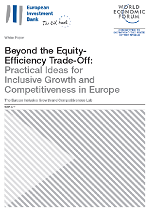Batsaikhan, Uuriintuya, Darvas, Zsolt, (2017), “European spring – Trust in the EU and democracy is recovering”, Bruegel, 24 March Increased support for populistic movements in the world’s richer countries is typically explained by two types of disappointment: economic insecurity and cultural backlash. Economic insecurity is fuelled by various factors, such as increased unemployment, slow wage growth or even wage drops, fears of ‘robotisation’, and cuts in social support through fiscal …Read More
The Gaps of Nations & The Rise of Far-Right Populism
Laboure, Marion, Braunstein, Juergen, (2017), “The Gaps of Nations & The Rise of Far-Right Populism”, LSE Euro Crisis in the Press, 23 March The rise of populism in 2016 has several potential explanations. Some commentators explain the US presidential election outcome as well as the Brexit vote as a form of protest with socio-economic origins. The tectonic plates upon which the socio-economic order of OECD countries rests have started to shift: …Read More
Fair or not? How credit rating agencies calculated their ratings during the Eurozone crisis
Boumparis, Periklis, Milas, Costas, Panagiotis, Theodore, (2017), “Fair or not? How credit rating agencies calculated their ratings during the Eurozone crisis”, LSE EUROPP, 23 March Credit rating agencies received a great deal of criticism during the Eurozone crisis, but what actually explains the changes that occur in a country’s credit rating? Drawing on new research, Periklis Boumparis, Costas Milas and Theodore Panagiotidis write that ratings agencies have responded differently to low-rated and high-rated …Read More
Is Italy Europe’s Next Big Worry?
Kirkegaard, Jacob, Funk , (2017), “Is Italy Europe’s Next Big Worry?”, Peterson Institute, 21 March Despite the prospects of a good year economically and politically for the euro area in 2017, uncertainty hangs on the horizon over Italy. Once the French election in May is over, investors’ attention will likely turn to Italy, where an election is due no later than May 2018. But the country may not be capable of …Read More
New ICMB/CEPR Report: Bail-ins and Bank Resolution in Europe
Philippon, Thomas, Salord, Aude, (2017), “New ICMB/CEPR Report: Bail-ins and Bank Resolution in Europe”, Vox Eu, 22 March Nine years since the Global Crisis of 2008 and two and a half years after the launch the banking union in November 2014, some European countries are still struggling with significant banking problems. The total amount of non-performing loans (NPLs) in the EU is around €1 trillion and its allocation is far …Read More
The Eurozone is Still Vulnerable
Marzinotto, Benedicta, (2017), “The Eurozone is Still Vulnerable”, Project Syndicate, 22 March When the economic calculus reverses, we can expect to experience a sense of déjà vu. Each country’s gain will entail another country’s loss, which will undermine inter-eurozone cooperation and fuel political tensions. The effects will likely reverberate through each country’s domestic politics, strengthening forces that favor disintegration. To be sure, reforms that were implemented in response to the …Read More
Beyond the Equity- Efficiency Trade-Off: Practical Ideas for Inclusive Growth and Competitiveness in Europe
The Europe Inclusive Growth and Competitiveness Lab, (2017), “Beyond the Equity- Efficiency Trade-Off: Practical Ideas for Inclusive Growth and Competitiveness in Europe”, European Investment Bank, World Economic Forum, March The European Investment Bank (EIB) and World Economic Forum have issued a call to action for social inclusion to be put at the heart of EU economic policy. It comes as a new joint White Paper by both organizations, with contributions from …Read More
EU Income Inequality And The Great Recession
Vcas-Soriano, Carlos, Fernández-Macías, Enrique, (2017), “EU Income Inequality And The Great Recession”, Social Europe, 21 March EU-wide income inequality declined notably prior to 2008, driven by a strong process of income convergence between European countries. The Great Recession broke this trend. After 2008, income convergence has been sluggish, while inequality within many countries has increased significantly. Despite the implicit assumption stemming from many EU policy documents that European economic integration should lead …Read More
Guidance to banks on non-performing loans
ECB Banking Supervision, (2017), “Guidance to banks on non-performing loans”, ECB, March A number of banks in Member States across the Euro area are currently experiencing high levels of non-performing loans (NPLs). There is broad consensus on the view that high NPL levels ultimately have a negative impact on bank lending to the economy1 , as a result of the balance sheet, profitability, and capital constraints faced by banks with …Read More
The Troika gave Ireland more autonomy over social security cuts than is commonly recognised
Hick, Rod, (2017), “The Troika gave Ireland more autonomy over social security cuts than is commonly recognised”, LSE EUROPP, 22 March The so called ‘Troika’ of the European Commission, European Central Bank, and the International Monetary Fund was frequently criticised during the Eurozone crisis on the basis that it had imposed austerity on countries requiring a bailout. But how accurate was this picture in reality? Drawing on new research in …Read More





